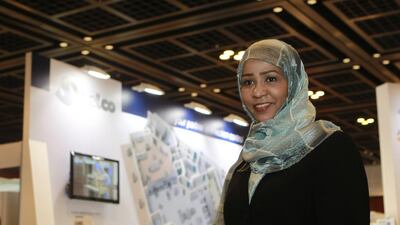DUBAI // A doctor who was on the front line in the fight to control the deadly Mers coronovirus believes basic health precautions could prevent the disease re-emerging during the Haj.
Dr Mushira Enani is head of the infectious diseases section at King Fahad Medical City in Riyadh, Saudi Arabia. In May, an outbreak at the hospital affected 23 members of staff and 22 patients, with one Filipina nurse dying of the illness.
Dr Enani was in Dubai on Tuesday to speak at the Patient Safety Middle East Exhibition & Conference.
Saudi Arabia has reported the highest number of Mers cases, but while incidents of the disease have declined in recent months, with millions of pilgrims making their way to Mecca for the annual pilgrimage there are fears of a new outbreak.
But Dr Enani said there were simple procedures pilgrims could follow to help to keep the disease under control.
“A combination of measures, including wearing a mask when in a crowded place, covering one’s face while coughing, taking required vaccinations and getting proper nutrition and sleep are what we are recommending to pilgrims,” Dr Enani said.
The Saudi Ministry of Health has also asked pilgrims to consult doctors before departing for Haj.
Dr Enani said people returning from Saudi Arabia needed to seek medical attention should they develop flu-like symptoms.
“If one does have any such symptoms, self-isolation is recommended. Re-emergence of the disease is a threat,” she said.
“Maintaining good personal hygiene as well as environmental hygiene are important. Terminal cleaning, which means to use agents to clear a room of all germs, needs to be done along with regular cleaning,” Dr Enani said.
She believed that authorities in Saudi were doing all they could to prevent an outbreak.
“The infection-control committee in Saudi Arabia monitors the spread of diseases. Also, an electronic system is in place now, which allows a disease to be caught early. Even if a case is diagnosed, hospitals will know about it immediately,” she said.
Dr Mansour Al Zarouni, director or SRL Diagnostics laboratory in Dubai Healthcare City, said safety precautions should continue to be followed at all times, not just during Haj.
“In the UAE, like in Saudi Arabia, the virus spread among healthcare workers,” he said.
“Learning from different industries will help us to ensure that patients as well as care givers do not fall prey to diseases.
“The measures that are employed during an outbreak, such as ensuring proper hand hygiene and training staff, should be continued later as well.”
International SOS, a company of experts in global health issues, is advising members to take extra precautions, both for Mers and the Ebola virus.
“Haj is a hugely important event and the advice from the global health authorities is that people deemed healthy and able should go ahead with their plans, as in previous years,” said Dr Issam Badaoui, medical director at the company.
“The number of reported cases of Mers has fallen in recent weeks, but our advice to members and the general public is to remain vigilant and take extra precautions to reduce the chances of contracting Mers or other infectious diseases.”
Saudi Arabia’s Ministry of Health has said it would not issue Umrah and Haj visas to pilgrims from Sierra Leone, Guinea and Liberia, which have been hard hit by the Ebola outbreak.
As of September 10, 727 cases of Mers had been confirmed by the World Health Organisation, with the Kingdom of Saudi Arabia reporting the highest number of cases. According to the WHO, the overall risk for visitors to contract Mers appeared to be low.
Those with chronic diseases, such as cancer, diabetes, heart disease, immune deficiency, kidney disease and the terminally ill, pregnant women and those aged over 65 or under 12 have been advised not to travel to Haj this year.
arizvi2@thenational.ae
* Additional reporting by Jennifer Bell


